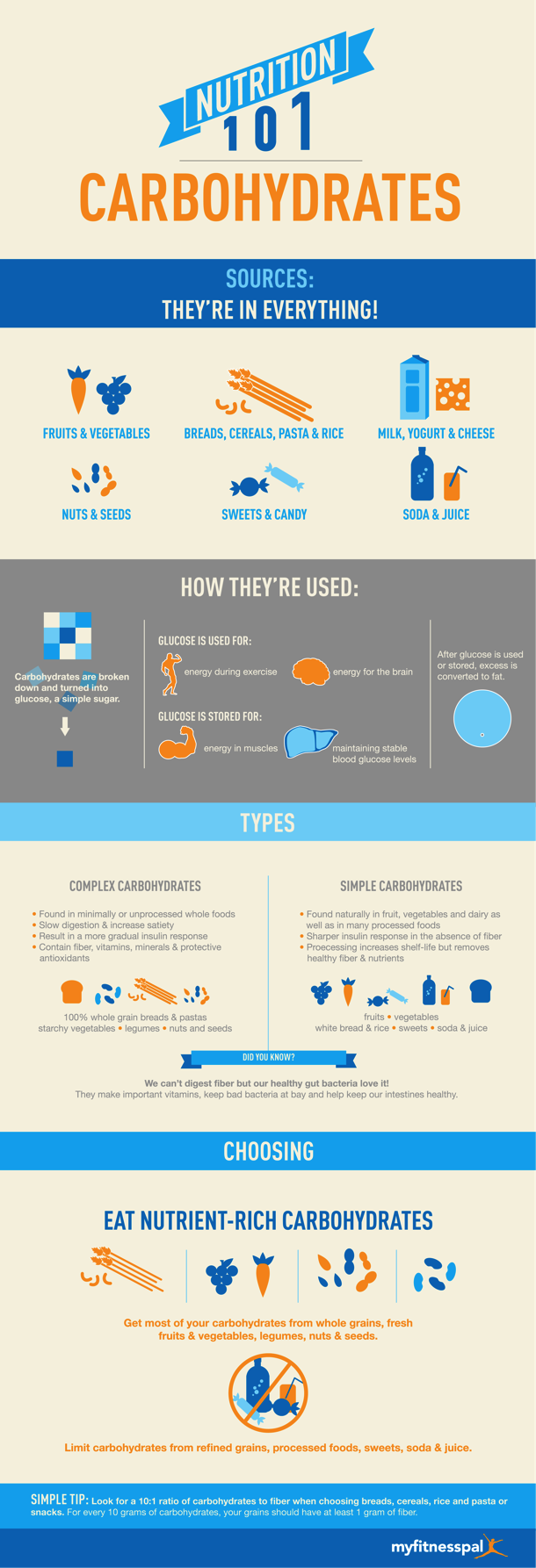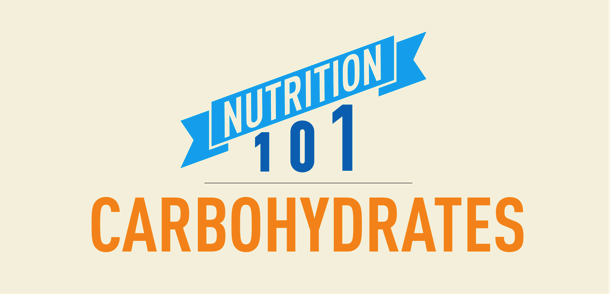
What Are Carbohydrates?
Mmmmmmmm....carbs!
From a pure "sciency" perspective, carbohydrates are made up of a collection of carbon, hydrogen, and oxygen molecules and your body uses them for the storage and transport of energy.
There are two types of carbohydrates; simple and complex. Your body can't directly process complex carbohydrates; they must be broken down into the simple form first (glucose, fructose, and galactose).
Once broken down and absorbed, these simple carbs go to the liver to fill energy stores. After that, they enter the bloodstream and venture out to the other cells of the body. This is when insulin is released to handle this “sugar load” on the body.
Did I lose you already?
Many of you have likely heard that carbs can have a negative impact on your results.
The truth of the matter is that carbohydrates are found in almost every food source and are the primary source of energy that our bodies need and use to perform optimally!
Carbohydrates Are Not Bad!
First things first, let's get this negative connotation about carbs out of the way. The real problem is that all carbs are treated as equal.
And while that may be true at the molecular level, the majority of carbs found in whole food sources are incredibly nutritious and contrary to popular opinion; should not be avoided!
3 Basic Types of Carbohydrates
- Simple – Candy, unnatural fruit juices, etc..
- Complex – Fruits, Veggies
- Processed – Bread, grain, pasta, etc.
Complex Carbohydrate Groups
- Monosaccharides - The simplest form of carbohydrates; they cannot be broken down into smaller carbohydrates; e.g. (glucose) and fruit sugar (fructose)
- Disaccharides – this is two joined monosaccharides and these are the simplest polysaccharides; e.g. table sugar (sucrose) and milk sugar (lactose)
These first two make up the simple type of carbohydrate detailed above.
- Polysaccharides - More than 10 linked monosaccharides that form a polymer; potatoes, rice.
Monosaccharides
- Glucose or dextrose
- Fructose
- Galactose
- Mannose
- Ribose and deoxyribose
Disaccharides
- Sucrose
- Maltose
- Trehalose
- Lactose
Polysaccharides
- Digestible
- Starch & Dextrins
- Glyocgen
- Partially Digestible
- Inulin
- Raffinose
- Indigestible
- Cellulose
- Pectin
Carbohydrate Sources
Simple Carbohydrates
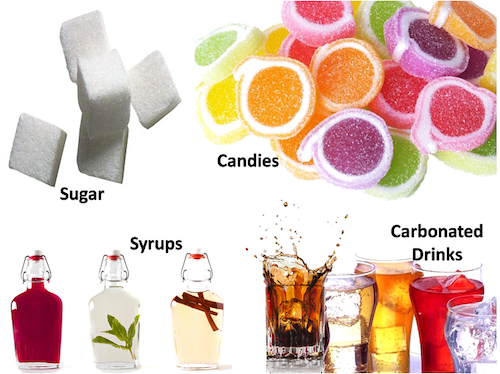
Simple carbs are going to have an immediate affect on you blood sugar levels. But this spike isn’t sustainable, it is short-lived and is burned pretty quickly.
At the same time, simple carbs typically have little to no nutritional content/value associated with them. Since simple carbs are basically made up of just sugar or some form of it, you get nothing more than the sugar rush and unfortunately crash as a result.
Examples
- raw sugar
- brown sugar
- corn syrup and high-fructose corn syrup
- glucose, fructose, and sucrose
- fruit juice concentrate
Complex Carbohydrates
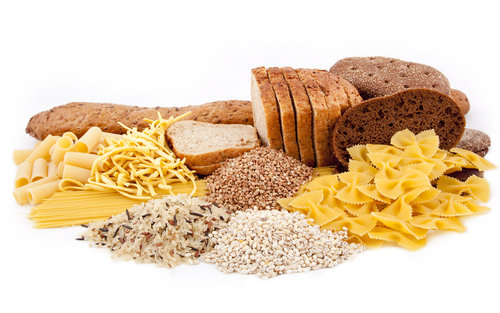
Complex carbs on the other hand have a much higher nutritional content/value associated with them and consequently have less of an effect on your blood sugar levels. This is good! The energy that is delivered is consistent and slowly burned/used by your body. In this light complex carbs following a hard workout is ideal.
You body NEEDS the energy and will burn through the energy provided and not store the excess as fat. The amount energy that you have expended with your workout is in correlation with your body telling you need to eat carbs.
Examples
- fruits
- vegetables
- nuts
- beans
- whole grains
Carbohydrate and the Glycemic Index
As previously mentioned, carbohydrates cause the release of insulin. The amount of insulin that is released into your blood stream is related to the amount of glucose (sugar) that is contained within the food you consume.
You can regulate the insulin response by limiting foods that contain a high amount of sugar in your nutrition/diet.
The glycemic index (GI) is a ranking of carbohydrates on a scale from 0 to 100 according to the extent to which they raise blood sugar levels after eating. Foods with a high GI are those which are rapidly digested and absorbed and result in marked fluctuations in blood sugar levels. Low-GI foods, by virtue of their slow digestion and absorption, produce gradual rises in blood sugar and insulin levels, and have proven benefits for health.
Low GI diets have been shown to improve both glucose and lipid levels in people with diabetes (type 1 and type 2). They have benefits for weight control because they help control appetite and delay hunger. Low GI diets also reduce insulin levels and insulin resistance.
Check out the chart below as a reference of the GI value for some of the food items that may be in your diet/nutrition. Keep in mind that you don't have to eliminate food items that are higher on the GI scale, just limit them or use them appropriately (see Carbohydrate Timing below).
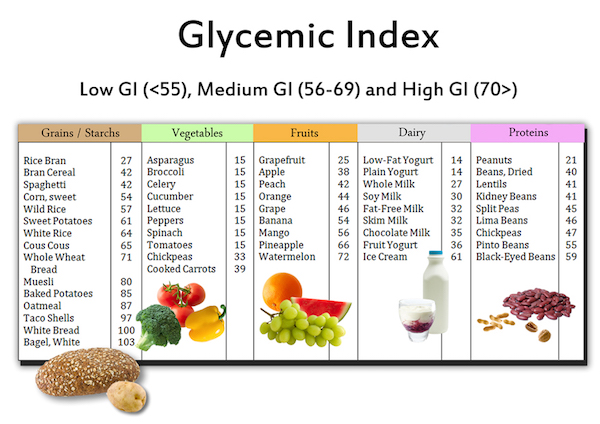
Carbohydrate Timing
Pre workout or post workout?
Both!
Before an intense cardio session or prior to a heavy lifting routine in a pre workout setting and regardless of the type of routine, your body needs the carb intake post workout.
There are really 4 Reasons You Need Pre-Workout Carbohydrates; insulin, less muscle breakdown, easy calories, and better pumps!
After an intense resistance training workout, your body is depleted, your muscles are depleted. If you were pushing yourself throughout your workout, your glycogen levels are going to be low and you need to replenish them in order to aid in the recovery and muscle building process.
Check out Why Post Workout Nutrition is Important and exactly how many grams of carbs your body needs in a post workout setting.
Fiber
An important component of complex carbohydrates is fiber. Getting enough fiber is important for overall health and disease prevention. And it keeps your plumbing in good working order.
How much fiber do you need?
The number of grams of fiber that you need on daily basis will vary between men and women.
For men 40-45 grams is ideal, whereas women need 30-35.
Carbohydrates - An Infographic
Everyone thinks carbs are bad...but the fact is; you kinda need them. There is a lot of "carb confusion" out there and choosing "good carbs" over "bad carbs" can seem a bit overwhelming at first.
This infographic does a great job of giving you an idea of what a carbohydrate is as well the two different types; simple and complex. I don't go out of my way to avoid carbs, but I do ensure that I am using carbohydrates effectively by knowing when should I eat carbs. Check out the infographic below and comment with what you learned about carbohydrates.
Recap
- Your body uses carbohydrates for the storage and transport of energy.
- There are two types of carbohydrates; simple and complex.
- Simple carbohydrates tend to have a high GI (glycemic index) value, whereas complex carbohydrates will usually have a lower GI value.
- Carbohydrates before and after a workout will maximize the use of energy they contain.
- Fiber is considered a carbohydrate and there are minimum amounts that should be ingested daily (men 40-45 grams / women 30-35 grams).
- There are 4 calories in every gram of carbohydrate.
Ready to Learn More?
If you want to learn more about the fundamentals of nutrition, check out the following 7-part series that I have created!
Hey, I'm Chris Coburn and I am a certified Precision Nutrition Level 1 Coach! Each week I will send you an email that will cover one easily digestible, essential building block on the fundamentals of nutrition.
The best part? They’re totally free.
To check out the free series, just click the button below.

